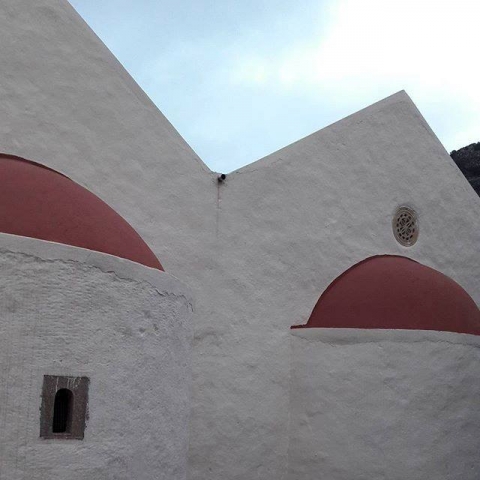Your Position:
Unknown
Λεπτομέρειες ΕικόναςImage details
More Photos




Press here.
Aghios Georgios Vrachassotis Monastery
Prefecture: Lassithi
, Suggest
, Suggest
Your Opinion

If you want to tell us your opinion about this place, please leave a comment
Post a Comment:
Aghios Georgios Vrachassotis Monastery
The monastery of St. Georgios Vrachasotis appears to have been set up in the second Byzantine period, flourishing in the Venetian period when the abbot was elected by the ruler of the Venetians in Crete (Papadakis 1986, 115), while in the years of Ottoman domination it participated actively in the revolution against the Turks. Today it is uninhabited, but big parts of the monastic complex have been restored, including apart from the church, the refectory, some cells, the olive press, an oven and other buildings. The church is a double-naved, vaulted and in the north aisle it bears frescoes dating to the 14th-15th century (1972 Platakis, 116). The entrance opens towards the south aisle, which was built later, and the lintel bears an inscription with the date 1592 (Gerola IV 1936, 520). Furthermore, in the attached three-storey belfry there is an emblem in carved relief with the date 1558 (Gerola IV 1936, 518).
A few centuries later, during the times of the Turkish occupation some very dramatic events take place in the monastery. According to the tradition, at the time of the Daskalogiannis revolution (1770), in the area of Campi, further up from the monastery some Turkish postmen raped the sister of Gabriel, who was the superior of the monastery at the time. Later that day, due to heavy rainstorms they decided to spend the night at the monastery. Superior Gabriel, who knew of his sister’s rape, at first welcomed the visitors and lead them to the cheese cellar to treat them. Always according to folklore, the superior, in order to take vengeance for his sister’s rape, arrested them and with the other monk’s aid boiled them in hot stock.
Thereafter, in his attempt to vanish any signs of his actions and get rid of the bodies, he threw them in a huge pot on Kolokyntha mountain.
Superior Gabriel, feeling guilty confessed his sin to the superior of Agios Georgios Epanosifis monastery, which belonged to Agios Georgios Vrahassotis monastery. The Turks were looking for the offender and whilst investigating the disappearance of their postmen they abused and tortured the superior of Epanosifis monastery, who was eventually forced to speak out the truth.
Numerous Turkish troops besieged the monastery of Agios Georgios Vrahassotis in order to arrest superior Gabriel causing a lethal battle. During that battle, the stone piece that was placed on the belfry, depicting St. George killing the lion, got shot. The mark left by the bullet can be seen today on the picture. According to the folklore, the bullet that hit the stone picture casted back killing the Turk that shot it in the first place.
The Turks managed to arrest superior Gabriel and delivered him to Maydani in Herakleion, to have him hanged. According to Dim. Kiriakakis, just before Gabriel’s execution, the hangman asked the superior how many Turks he had killed. Pretending he didn’t hear clearly, Gabriel managed to make his hangman get closer to him and by distracting his attention he hit and killed him, answering then: “I ‘ve killed ninety nine Turks so far and now one hundred”. Superior Gabriel could not escape his execution and was eventually hanged on the famous oak tree of the big Castro (castle). Afterwards, the Turks destroyed all the parts of the monastery, except the church, confiscated all the plots of land around it and gave them to public auction. The people of Vrahassi then, bought most of them so they could return them back to the monastery in time.Nevertheless, the monastery of Agios Georgios Vrahassotis remained a rock cradle for the always revolutionary Cretans. Inside the monastery, a laboratory using watermills used to produce gunpowder for the needs of the struggle for freedom. In 1820, another battle against the Turks took place at the monastery. In that battle, 18 monks were killed and their superior managed to run away. He was chased beyond the monastery, around the mountains of Vrahassi and in the area called “tou patera ta katsoprinia”(translating as the father’s small oak trees) he was shot dead.
The twentieth monk of the monastery was safe as he was away to Agarathos monastery and so he became the next superior. In 1823, in a battle close to the monastery, Ioannis Mihelidakis Sfakianakis died, father of the later chieftain Konstantinos Sfakianakis. In 1859 a monk from Vrahassi, called Manidopateras became the next superior of the monastery and a radical refurbishment took place in the monastery. Then, the people of Vrahassi, returned the pieces of land they had bought in the auction a few years ago, back to the monastery. In 1866, when the next Cretan revolution broke, superior Manidopateras blessed the weaponry of the rebels of east Crete and of their vrahassian chieftain Konstantinos Sfakianakis, inside the church of Agios Georgios Vrahassotis. A few years after the end of the revolution, superior Manidopeteras invited an artist from Lassithi, called Manolis Makrakis to do the chancel screen of the monastery. He provided him with the best materials and the result was magnificent.
The monastery closed in 1909 and its last superior was called Dinerakis.
During the German occupation the monastery was used as a hideaway for the partisans of EAM ELLAS (the Hellenic Liberating Army). The ceremony during which Vrahassi went back to being a Community was held on 31/12/2006, inside the church, after eight years of struggles for the local people and authorities of Vrahassi and Milatos. The graceful eparch of Petra and Herronissos, Nektarios also attended the touching ceremony.
There has been great effort lately to restore and reconstruct the cells of the monastery by a committee set by Vrahassi community. This effort has given great results as there are celebrations on St. George’s and St. Dimitrios’ Day by the Vrahassi parish to which the church belongs, whilst other ceremonies such as marriages or christenings take place at times in the church.
Places near Aghios Georgios Vrachassotis Monastery
Vrachassi is a Village in Neapoli in Lasithi in the Crete Region of Greece.
Vrachassi is also a Beach, a Listed traditional settlement and a Municipal district.
The postal code of Vrachassi is 72054 and its telephone access code is +3028410.
Vrachassi is at an altitude of 205 meters.
In 1991, Vrachassi's population was 522, down from 921 in 1981.
Locations near Vrachassi include the Village of Latsida and the Settlement of Selinari.










